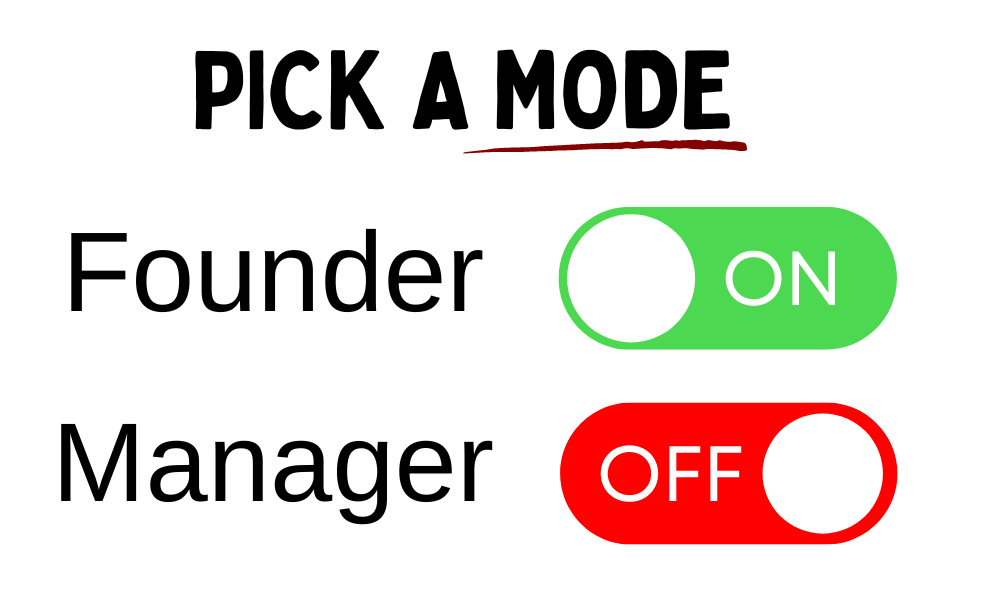How To Go Founder Mode As An Engineering Manager
Why be only in manager mode all the time, when you have two options.
What the heck is this Founder Mode everyone is talking about?
Recently, Paul Graham published an essay on this topic. He wrote:
“In effect there are two different ways to run a company: founder mode and manager mode. Till now most people even in Silicon Valley have implicitly assumed that scaling a startup meant switching to manager mode.”
Although he didn’t define founder mode, his essay sparked a lot of debate and discussion. Sometimes, it’s the fuzzy things that catch attention on the internet, but I digress.
It got me thinking: Can Engineering Managers apply founder mode? What does founder mode look like for EMs? I’ve seen some successful EMs behave in a way that can be called founder mode. So, my answer is “Yes”.
Here are three main founder mode behaviors of Engineering Managers.
1. Being An Owner
I once needed another team to deliver a dependency. A few days later, I had a second request. The EM of that team responded, “I can only prioritize one thing, pick which one”. That response felt wrong to me.
That EM was focused solely on managing priorities and resources, missing the broader impact on the product and users. Eventually, this team was dissolved for not working on the right things.
Prioritize the needs of customers and what’s best for the company as a whole. Think long-term, putting organizational goals ahead of team or individual goals.
When I worked at a startup, we lived by the value of “Be an Owner”, but as companies grow, that sense of ownership fades. People start acting more like renters than owners. Founder mode helps Engineering Managers bring back that ownership mindset.
2. Delegating Mindfully
A few months ago, some stakeholders expressed a need for a developer productivity tool. The idea resonated with me, so I handed it off to my tech lead to explore. He struggled with it, saying, “I just don’t see it.”
This project was crucial. It was an opportunity to increase impact and grow the team. So I had two options: push the lead to figure it out or take it up myself. I sought advice from my mentor, who told me, “If you believe in it and can take it further, why delegate? If you’re the best person for the job, then do it.” That advice stuck with me.
Don’t be a serial delegator. Involve yourself, especially on the things that need the most attention. Be ready to help resolve any ambiguity by jumping in - learning the problem, doing PoCs, documenting the vision and plan.
Founder mode isn’t about avoiding delegation or micromanaging. It’s about understanding what to delegate and what not to. It’s about being involved in the right tasks at the right level.
3. Building Culture
How does your team behave when someone causes an incident? How does your team treat a new member? How do they hire? It's all driven by the culture.
For engineers, team culture often has a greater impact than overall company culture because they live and experience it more closely.
As an Engineering Manager, whether you’re reprimanding someone for missing a deadline or praising them for working over the weekend, you’re shaping your team’s culture.
Take into account the specific needs, goals, and realities of the team and then intentionally create the right culture. Reinforce by rewarding good behaviors.
The culture you build will live even beyond your tenure. So don't just focus on creating processes, build culture.
Closing Thoughts
Founder mode isn’t just for startup founders. It’s a mindset that Engineering Managers can and should adopt. Especially if you don’t have PMs to work with.
Manager mode is important for you to scale your team and impact. To reduce the risks and improve predictability. But that shouldn’t be your only mode.
To be an effective Engineering Manager, you need to know when to switch between the two. It’s all about using good judgment to get the best of both worlds, not the worst of both!
More Resources
- ‘s interview with Airbnb CEO, Brian Chesky, who triggered Graham to write the essay.
Project Thinking vs Product Thinking, a similar concept by



Very well illustrated Suresh! 👏🏻
Well said! EMs have sometimes been misadvised to delegate tasks without grasping the underlying details. This approach, in my view, undermines their effectiveness. You're correct that EMs shouldn't be seen as serial delegators; their role requires a deeper understanding and involvement to really make an impact and create value for the org.